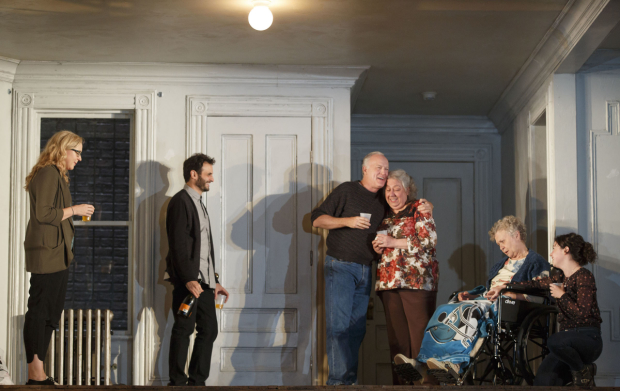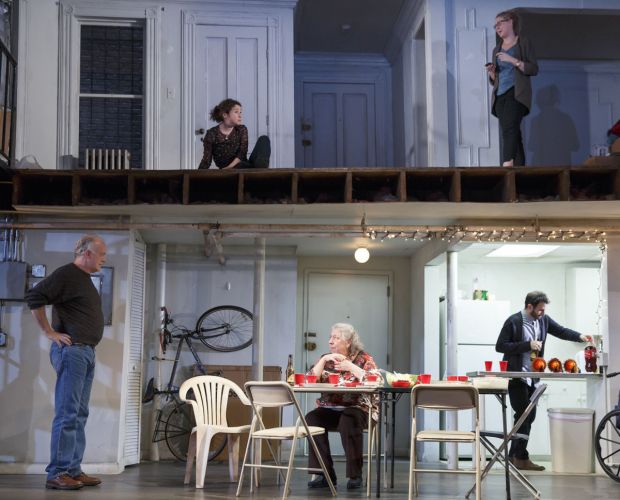The Humans

(© Joan Marcus)
Next month, American families will gather for Thanksgiving dinner, an annual ritual marked by excess in food, drink, and drama. Playwright Stephen Karam offers what might be a little preview of that holiday with The Humans, now making its off-Broadway debut with the Roundabout Theatre Company at the Laura Pels Theatre (Karam's work last appeared at Roundabout with 2011's Sons of the Prophet). Jarringly authentic in language, performance, and design, this play is likely to feel all-too-familiar for many theatergoers.
The Blake family has assembled for Thanksgiving at the Chinatown apartment that youngest daughter Brigid (Sarah Steele) shares with her long-term boyfriend, Rich (Arian Moayed). It's a somewhat awkward affair, considering they've just moved in and most of their belongings are still on a truck in Queens. Erik (Reed Birney) and Deirdre (Jayne Houdyshell), Brigid's parents from Scranton, look askance at this spartan abode, even though the spacious Manhattan duplex would leave most New Yorkers green with envy. Along with elder daughter Aimee (Cassie Beck) and Erik's elderly mother, Fiona (Lauren Klein), they feast on Turkey served on paper plates and washed down by copious amounts of wine. In vino veritas: As the evening progresses, the unsaid gets said — a Thanksgiving tradition as old as the Mayflower.
Karam has managed to craft unsettlingly naturalistic dialogue to accompany this makeshift Thanksgiving dinner. The crisp and articulate back-and-forth usually found in similar dinner table dramas is thrillingly missing here. Karam's characters grasp for the appropriate words to express their thoughts, their feelings shrouded in a blend of prudence and humor. It's a biting and dark Irish-American humor, delivered with the subtlety of a drive-by shooting.
The superb Jayne Houdyshell runs away with the best one-liners in the show. "Thank you, Richard…champagne’ll make the cups feel fancy," she comments as Rich pours Moscato d'Asti into plastic cups. Thanks to Houdyshell's nuanced performance, Deirdre's copious wit shines through the bleak circumstances surrounding her. "Did I e-mail you that — Kay Hoban has ovarian cancer," she casually asks over crudités. She seems like the type of person who reads the obituary section for fun.
As the angst-ridden millennial daughter (a role Steele has perfected), Brigid often seems embarrassed by her mother, getting in a few barbs of her own: After Deirdre comments how hard it is to stay on track with her diet, Brigid comments, "Especially if you eat a bucket of ranch dip before dinner." Beck's Aimee (simultaneously tragic and composed) plays the role of referee, preventing things from going too far. Meanwhile, Fiona babbles incoherently in the corner, long surrendered to dementia. Klein's performance is startlingly real and completely heartbreaking in her interactions with her son.
The great chameleon of the American stage, Birney gives a portrayal of Erik that makes us imagine what Joe Biden would look and sound like had he become a maintenance man rather than a politician. He's a working-class equipment manager at a Catholic high school and therefore suspicious of the big-city money from which the aptly named Rich comes. Rich (given the Semitic surname "Saad" in the program) is clearly the outsider among this clan of Celts. He's a 38-year-old social work student who will gain access to a trust fund in two years. Moayed plays him with the right mixture of amiable charm and spacy quixotism, a welcome refuge from the harsh pragmatism of the Blakes.
The depressing travails of the Irish-American family have been a fixture onstage since Eugene O'Neill. Karam adds to that tradition with his own keen sense of truth. Never has there been a more realistic encapsulation of the electricity generated when multiple generations come together under one roof for a perfunctory dinner.

(© Joan Marcus)
Director Joe Mantello succeeds in fostering this authenticity by stepping out of the way of his insanely talented cast, but also by giving attention to detail in the play's smart design. It looks like a giant pulled off the fourth wall in David Zinn's set, the space between the floors perfectly on view. Also, the open layout of the duplex (complete with spiral staircase) allows for plenty of inadvertent eavesdropping. Justin Townsend creates the dim, artificial lighting of a basement apartment in late November. Sound designer Fitz Patton replicates the clanging pipes and noisy neighbors one hears in a prewar apartment in Manhattan, causing us all to jump every time we hear a bang coming from the unit above. A menacing dread hangs in the air, keeping us all on edge as if we were watching a particularly good horror film.
In the end, the things lurking in the shadows aren't nearly as troubling as that which is in full view, but conspicuously ignored. Eschewing a squeaky-clean resolution, Karam leaves the Blakes much as he found them: solidly holding together despite multiple unresolved issues. We should all feel thankful if we're able to say the same about our own families come December.










